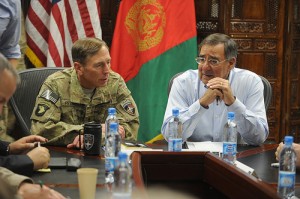Snickers Bars and Fudged ISIS Intelligence
Yesterday, Shane Harris and Nancy Youssef informed us that there is now a second allegation of manipulation of intelligence on ISIS:
U.S. military analysts told the nation’s top intelligence official that their reports on ISIS were skewed and manipulated by their bosses, The Daily Beast has learned. The result: an overly optimistic account of the campaign against the terror group.
The complaints, lodged by analysts at U.S. Central Command in 2015, are separate from allegations that analysts made to the Defense Department inspector general, who is now investigating “whether there was any falsification, distortion, delay, suppression, or improper modification of intelligence information” by the senior officials that run CENTCOM’s intelligence group.
This second set of accusations, which have not been previously reported, were made to the Office of the Director of National Intelligence (ODNI). They show that the officials charged with overseeing all U.S. intelligence activities were aware, through their own channels, of potential problems with the integrity of information on ISIS, some of which made its way to President Obama.
Once again, it is senior officials at CENTCOM who are accused of manipulating the reports from analysts to make it look as though the US is making more progress against ISIS than is actually happening.
I had never gotten around to posting on this issue when the first accusations came out, but it is my belief that neither investigation will find these senior people at CENTCOM to be guilty of any transgressions. Instead, it seems very likely to me that these officers will claim that they were taking part in an Information Operation aimed at making the fighters within ISIS think that the situation is deteriorating more than is the actual case. I wrote about operations of this sort, termed MILDEC (for Military Deception) back in 2010.
One tidbit I had found back then related to the functions of MILDEC:
Causing ambiguity, confusion, or misunderstanding in adversary perceptions of friendly critical information, which may include: unit identities, locations, movements, dispositions, weaknesses, capabilities, strengths, supply status, and intentions.
Simply by stating that this is what they were doing, these senior officers seem likely to avoid any negative consequences for what they have done. But Harris and Youssef seem to think that the fudging of data was done to fit the intelligence to the Obama administration’s previous comments:
The analysts have said that they believe their reports were altered for political reasons, namely to adhere to Obama administration officials’ public statements that the U.S.-led campaign against ISIS is making progress and has put a dent in the group’s financing and operations.
While that does seem like a distinct possibility, it feels backwards to me. Although the Pentagon is not allowed to aim any of its propaganda toward a US audience (unlike recent loosening of this regulation for propaganda from the State Department), I would think that the real target for these senior officers would be the President and Congress. Even though they have the cover of saying they are spinning yarns to fool ISIS, keeping the bosses who control the purse strings happy would fit quite well with what is going on. [Over at Moon of Alabama, b has an alternate theory about various forces at work relating to ISIS, especially in Syria.]
What a coincidence for me, though, that as I was thinking about MILDEC relating to capability estimates of ISIS, this hilarious AP story came out less than 24 hours later:
Faced with a cash shortage in its so-called caliphate, the Islamic State group has slashed salaries across the region, asked Raqqa residents to pay utility bills in black market American dollars, and is now releasing detainees for a price of $500 a person.
The extremists who once bragged about minting their own currency are having a hard time meeting expenses, thanks to coalition airstrikes and other measures that have eroded millions from their finances since last fall. Having built up loyalty among militants with good salaries and honeymoon and baby bonuses, the group has stopped providing even the smaller perks: free energy drinks and Snickers bars.
Interestingly, the story goes back over most of the information in those two opening paragraphs and makes attributions (although some look pretty flimsy) for the sources of the information. The Snickers part, however, is credited to no sources.
At a time when senior officers at CENTCOM are fudging data on ISIS supplies and capabilities, perhaps as part of an Information Operation, why shouldn’t they throw in a gratuitous Snickers jab?
But then again, if ISIS really isn’t getting their Snickers bars, we could be in big trouble:

